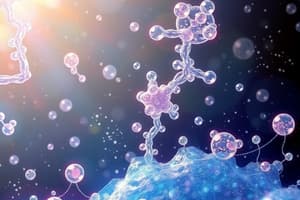Podcast
Questions and Answers
What are the simplest forms of carbohydrates consisting of a single sugar molecule?
What are the simplest forms of carbohydrates consisting of a single sugar molecule?
Monosaccharides
Give an example of a monosaccharide that usually requires minimal processing before being absorbed by the body.
Give an example of a monosaccharide that usually requires minimal processing before being absorbed by the body.
Glucose
How are disaccharides formed?
How are disaccharides formed?
When two monosaccharides join together through a condensation reaction, resulting in the loss of a water molecule.
Provide an example of a disaccharide formed during starch digestion.
Provide an example of a disaccharide formed during starch digestion.
In carbohydrate classification, what category do oligosaccharides and polysaccharides belong to?
In carbohydrate classification, what category do oligosaccharides and polysaccharides belong to?
Give an example of an oligosaccharide and state its source.
Give an example of an oligosaccharide and state its source.
What is the main difference in the rate of glucose entry into the bloodstream between consuming disaccharides and monosaccharides?
What is the main difference in the rate of glucose entry into the bloodstream between consuming disaccharides and monosaccharides?
Name a polysaccharide that is primarily found in plant walls.
Name a polysaccharide that is primarily found in plant walls.
What are the two examples of polysaccharides mentioned in the text?
What are the two examples of polysaccharides mentioned in the text?
Explain how the complexity of oligosaccharides and polysaccharides affects the rate of glucose entering the bloodstream post-consumption.
Explain how the complexity of oligosaccharides and polysaccharides affects the rate of glucose entering the bloodstream post-consumption.
Flashcards are hidden until you start studying
Study Notes
Carbohydrates: Understanding Types and Subtypes
Carbohydrates are one of the three major classes of nutrients, alongside proteins and fats. They serve as the body's primary energy source, contributing to various physiological processes such as maintaining normal blood glucose levels, controlling insulin metabolism, and participating in cholesterol and triglyceride metabolism. Carbohydrates form an integral part of our diets, encompassing a range of substances from simple sugars to complex polymers.
Simple vs Complex Carbohydrates
The classification of carbohydrates can be divided into simple and complex varieties. The former is comprised of mono- and disaccharides, while complex carbohydrates include oligosaccharides and polysaccharides.
Simple Carbohydrates
Monosaccharides
These are the simplest forms of carbohydrates, consisting of a single sugar molecule. Examples include glucose, galactose, and fructose, which usually require minimal processing before being absorbed by the body. Their simplicity allows for rapid absorption and utilization for immediate energy release, leading to quick increases in blood glucose and subsequently insulin secretion.
Disaccharides
These are formed when two monosaccharides join together through a condensation reaction, resulting in the loss of a water molecule. Examples of disaccharides include sucrose (table sugar), lactose (milk sugar), and maltose (formed during starch digestion). Consuming disaccharides results in slower rates of glucose entry into the bloodstream compared to monosaccharides, ensuring a sustained source of energy.
Complex Carbohydrates
Oligosaccharides
Oligosaccharides consist of three to ten monosaccharides linked together. Examples include maltodextrins, derived from starch, and raffinose, present in legumes. As with disaccharides, their complexity leads to slower absorption and a slower rate of glucose entering the bloodstream post-consumption.
Polysaccharides
These are large, linear or branched molecules composed of hundreds or even thousands of monosaccharides linked by glycosidic bonds. Polysaccharides play crucial roles as storage materials, structural components, and as components of cell surfaces. Amylose and cellulose are examples of polysaccharides. Amylose is primarily found in grains, tubers, and roots, while cellulose is predominantly found in plant walls.
Studying That Suits You
Use AI to generate personalized quizzes and flashcards to suit your learning preferences.




